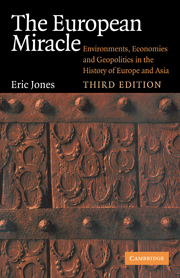Book contents
- Frontmatter
- Contents
- Preface to the third edition
- Preface and acknowledgements
- Introduction to the second edition
- Map
- EURASIA
- EUROPE
- 3 Technological drift
- 4 The Discoveries and ghost acreage
- 5 The market economy
- 6 The states system
- 7 Nation-states
- THE WORLD
- ASIA
- EURASIA
- Afterword to the third edition
- Annotated bibliographical guide to Eurasian economic history in the very long term
- Bibliography
- Supplementary bibliographical guide
- Index
4 - The Discoveries and ghost acreage
Published online by Cambridge University Press: 05 June 2012
- Frontmatter
- Contents
- Preface to the third edition
- Preface and acknowledgements
- Introduction to the second edition
- Map
- EURASIA
- EUROPE
- 3 Technological drift
- 4 The Discoveries and ghost acreage
- 5 The market economy
- 6 The states system
- 7 Nation-states
- THE WORLD
- ASIA
- EURASIA
- Afterword to the third edition
- Annotated bibliographical guide to Eurasian economic history in the very long term
- Bibliography
- Supplementary bibliographical guide
- Index
Summary
I sing of dews, of rains, and, piece by piece,
Of balm, of oil, of spice, and ambergris.
I sing of time's trans-shifting…
Robert Herrickfrom the fifteenth century, Europe added to its physical resource base and potential market in a great ballooning expansion overseas. The story of the Discoveries is a familiar one which, however, is properly seen as the European culmination of Eurasian technological advances and earlier European probing, and the outcome of which was a major impetus to Europe's development. The conventional starting point is the 1490s, with Columbus's voyage across the Atlantic and Vasco da Gama's visit to India. This is too simple. Both events were stages – long jumps certainly - in an old endeavour to pierce the void apparently surrounding Europe. The Portuguese in particular had been systematically ranging out to the Atlantic islands and down the west coast of Africa since very early in the century. Close examination shows that European society had been pulsating and probing at its bounds for a long time before that, at least since the tenth-century turning of the tables on her invaders, or earlier still if the Viking crossing of the North Atlantic be included.
The expansion following the last years of the fifteenth century is also less straightforward than at first seems to be the case. Leap-frogging movements of people continued to take place within Europe and on its eastern, landward margins.
- Type
- Chapter
- Information
- The European MiracleEnvironments, Economies and Geopolitics in the History of Europe and Asia, pp. 70 - 84Publisher: Cambridge University PressPrint publication year: 2003



